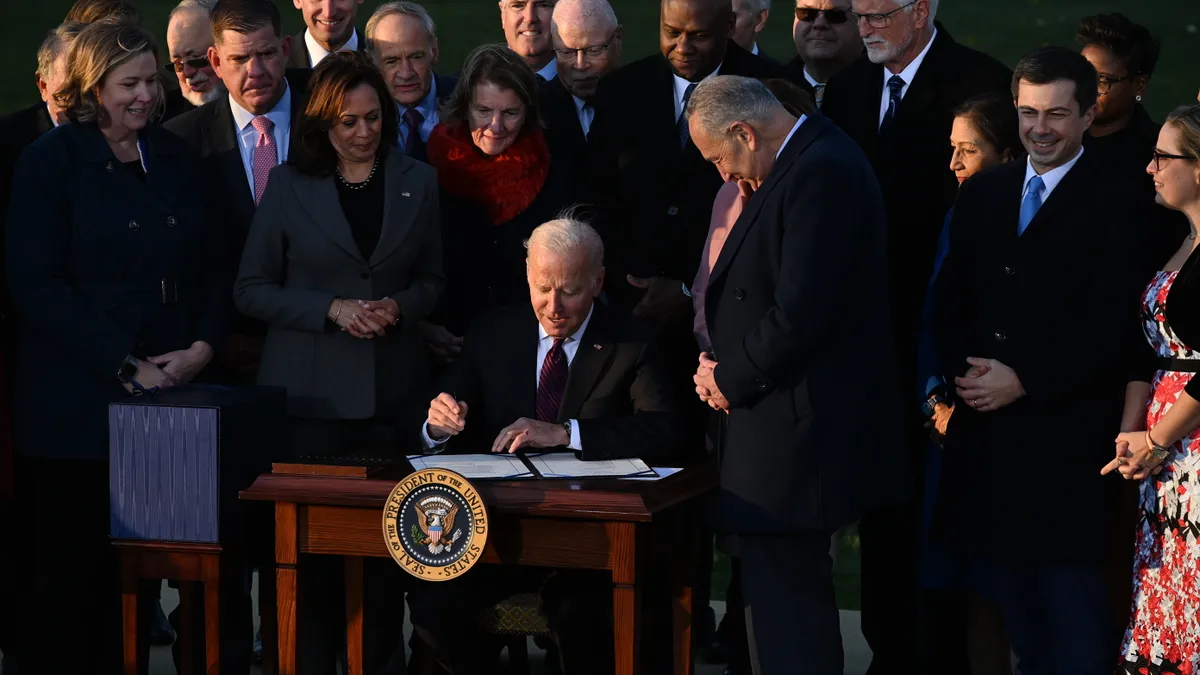The U.S. is considering revoking normal trade relations with Russia in retaliation for the country’s ongoing deadly invasion of Ukraine.
The House of Representatives approved a bill March 17 to suspend normal trade relations with Belarus as well as Russia, subjecting the countries to tariff rates reserved for non-favored trading partners. The legislation, which still needs Senate approval, is expected to be signed into law by President Joe Biden.
Removing its "most favored nation" status might appear mostly symbolic, especially at first. But it sets the stage for broader U.S. sanctions against Russia’s entire economy, rather than against specific individuals, companies and exports.
"It’s the normative status of further making Russia and the Russian economy an international pariah," said Michael Murphree, assistant professor of international business at the University of South Carolina. "It's saying that as a result of the situation in Ukraine, Russia will not be able to be treated in any sector of the global economy like a normal nation."
While the effects on supply chains might be delayed, lowering Russia’s trade standing with the U.S. — an action expected to be taken alongside allied countries — isn’t just a procedural maneuver to further isolate and embarrass Russia in response to the deadly invasion of Ukraine.
The most-favored nation status designation is a set of fair-trading standards between countries established by the World Trade Organization. Revoking it allows the U.S. "the right to set whatever tariffs or other trade restrictions [it] want[s] across an entire economy," Murphree said.
Previously announced sanctions have been limited to individuals, including President of Russia Vladimir Putin and members of his circle, companies and certain sectors of the Russian economy, such as alcohol and seafood.
"There are still several sectors which have not yet been sanctioned for which Russian exports are fairly significant," Murphree said.
About 12% of U.S. fertilizer imports came from Russia last year, Murphree said. Base metals (which make up 10.5% of total imports), iron and steel (7%), lead (6%) and nickel (5.8%) could see surges in prices as companies look for alternative sources to replace Russia, he said.
"It's not just that the Russian goods themselves will become more expensive because of the imposition of tariffs, but the competition for non-Russian sources will drive up those prices as well," Murphree said.
Still, the House bill, introduced by Rep. Richard Neal of Massachusetts, may not impact many of Russia's top exports to the U.S. as written.
Fertilizers, platinum and palladium, for example, would see no major rate changes under the proposed legislation. The bill, however, would allow the president to impose higher tariffs than what's reserved for non-favored trading partners.
Non-favored trading partners are required to pay a 6.6-cent-per-kilogram tariff on nickel products and a 6% tariff on copper, according to the U.S. International Trade Commission. Favored trading partners are not subjected to any tariffs for these products.
Non-favored trading partners are also subjected to 18.5% tariffs on aluminum products, instead of the 2.6% for favored partners.
Automakers have already noticed a dramatic increase in nickel prices, which could push vehicle prices higher, according to Berk Birand, CEO of Fero Labs, an industrial AI software company.
"Nickel is used extensively within Li-Ion production, so this rise is expected to affect EV prices," Birand said in an email. "Nickel is also a key component in the stainless steel process."
As costs and disruptions escalate, visibility is critical for companies to know how their supply chains will be affected, said Julie Gerdeman, CEO of Everstream Analytics, a predictive analytics firm.
"You’ve got to know who your suppliers’ suppliers are in your tiers," Gerdeman said. "You need to be able to map and monitor risk, and that’s at the supplier, material and the facility location levels."






















